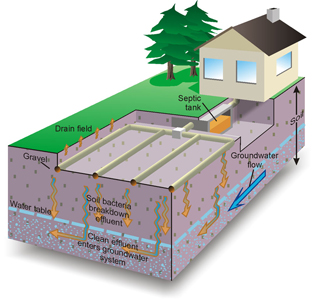When your septic tank system is not operating correctly, you will be able to see telltale signs if you know where to look.
1. Pipe Gurgling Sounds
If you flush the toilet or run the water and hear gurgling coming from the pipes it may be an indication the tank is full, needs pumping or has other problems.
2. Toilet Flushing Issues
When the toilet is slow to flush or won’t flush, and a plunger doesn’t fix the issue it could be something wrong with the septic system. It could be the tank is full, something that’s easily solved by having the tank pumped. It may also be an indication of a clog in the pipes.
3. Slow Drains
3. If the kitchen sink, bathroom sink, shower or bathtub are draining slowly, it could point to a problem with the pipes in your home (time to call a plumber) or the septic system (time to call Magneson Tractor Service).
4. Water Backup
If water is backing up when you run the washing machine or worse yet sewage has backed up into the house, it’s time to call for help. Sewage backups are one of the worse symptoms of a failing septic system.
5. Bad Odors
All you need to tell that something is wrong with the septic tank is a good sense of smell. Keep getting a whiff of rotten eggs in summer? Unless they are leftover from the last Easter Egg hunt, you are likely smelling toxic sulfur. If you walk outside near where the septic tank is buried and the smell increases it’s possible raw sewage has escaped the tank.
6. Greener Grass
The grass getting greener in one area of the yard is not a result of rain hitting that one location. One of the first signs the septic leach field is failing is the grass is growing faster or greener than the rest of the property. The lawn is enjoying the extra fertilizer at the roots, and this means the septic could be experiencing issues.
7. Patches of Standing Water
When you walk in the yard and see puddles or patches of standing water near the drain field it is a sign something is very wrong with the septic system. The system is failing, so smelly water is accumulating at the drain field, something that can pose a health hazard and must be addressed immediately. At the first sign of puddles near the septic tank, call in the experts!
Causes of Septic Tank Problems
Often septic tank problems are caused by things entering the tank that shouldn’t be by way of the toilet, kitchen sink, or garbage disposal.
The only item that should be flushed down the toilet (in addition to human waste) is septic safe toilet paper. The kitchen sink should be gray water only avoiding solids and heavy use of the garbage disposal.
Understanding Potential Leach Field Problems
Avoid these common septic tank problems associated with issues near the leach field.
Never park a car or heavy equipment over the drain field. The excess weight will cause problems such as cracking and buckling that can upset the function of the tank.
The area above the drain field should be obstruction free. Heavy items or traffic can result in the pipe below becoming compromised. If the pipe becomes compacted and then broken, this can cause damage to your leach field and can be a costly repair to make.
Sludge overload near the drain field can result in sulfite and bio-mat buildup, both of which require a septic technicians expertise to alleviate before your system backs up.
When grease is poured down the sink or into toilets, it will eventually cool and harden down the line. Hardened fats can cause capping, the cutting off of all oxygen in the system, and will damage the leach field.
Never plant any new trees near the septic tank drain field. Roots will eventually seek out moisture underground, and will penetrate the tank, drain field or pipes associated with the septic system. Once the roots reach the source of the moisture, they will grow rapidly and cause significant damage.


